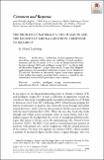Files in this item
The problem of natural divine causation and the benefits of partial causation : a response to Skogholt
Item metadata
| dc.contributor.author | Leidenhag, Mikael | |
| dc.date.accessioned | 2020-08-31T09:30:02Z | |
| dc.date.available | 2020-08-31T09:30:02Z | |
| dc.date.issued | 2020-09 | |
| dc.identifier | 269246310 | |
| dc.identifier | 491a7e89-e68e-4039-be92-c1a093125801 | |
| dc.identifier | 85089904943 | |
| dc.identifier | 000563099700008 | |
| dc.identifier.citation | Leidenhag , M 2020 , ' The problem of natural divine causation and the benefits of partial causation : a response to Skogholt ' , Zygon , vol. 55 , no. 3 , pp. 696-709 . https://doi.org/10.1111/zygo.12632 | en |
| dc.identifier.issn | 0591-2385 | |
| dc.identifier.uri | https://hdl.handle.net/10023/20528 | |
| dc.description.abstract | In this article, I defend my previous argument that natural divine causation suffers under the problem of causal overdetermination and that it cannot serve as a line of demarcation between theistic evolution (TE) and intelligent design (ID). I do this in light of Christoffer Skogholt's critique of my article. I argue that Skogholt underestimates the naturalistic ambitions of some current thinkers in TE and fails, therefore, to adequately respond to my main argument. I also outline how partial causation better serves as a model for the relationship between God's providence and evolution. | |
| dc.format.extent | 144734 | |
| dc.language.iso | eng | |
| dc.relation.ispartof | Zygon | en |
| dc.subject | Causality | en |
| dc.subject | Intelligent design | en |
| dc.subject | Overdetermination | en |
| dc.subject | Panentheism | en |
| dc.subject | Theistic evolution | en |
| dc.subject | Theistic naturalism | en |
| dc.subject | BV Practical Theology | en |
| dc.subject | Q Science | en |
| dc.subject | T-NDAS | en |
| dc.subject.lcc | BV | en |
| dc.subject.lcc | Q | en |
| dc.title | The problem of natural divine causation and the benefits of partial causation : a response to Skogholt | en |
| dc.type | Journal article | en |
| dc.contributor.institution | University of St Andrews. School of Divinity | en |
| dc.identifier.doi | https://doi.org/10.1111/zygo.12632 | |
| dc.description.status | Peer reviewed | en |
This item appears in the following Collection(s)
Items in the St Andrews Research Repository are protected by copyright, with all rights reserved, unless otherwise indicated.

